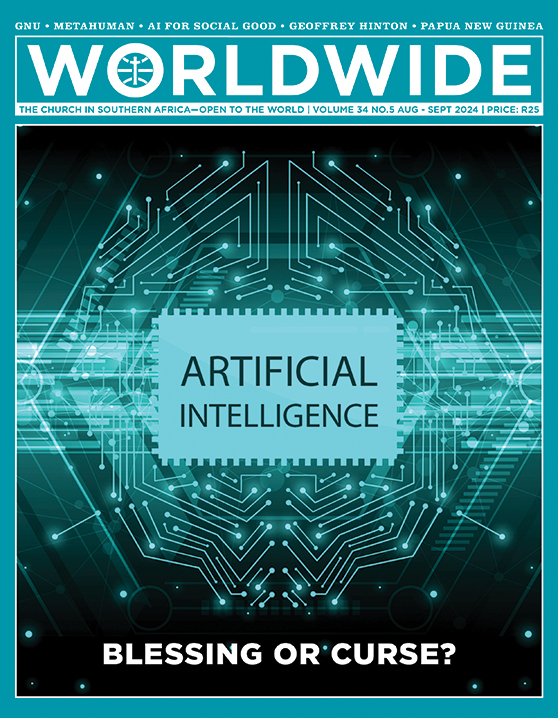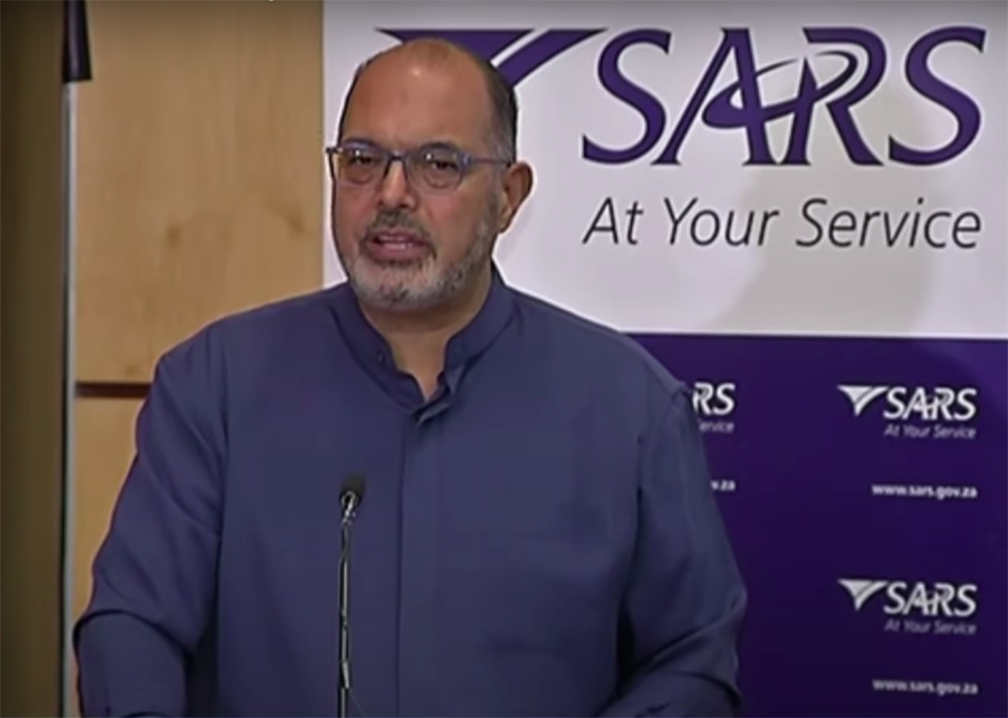
ARTIFICIAL INTELLIGENCE: BLESSING OR CURSE?
The image, according to Chat GPT, features the phrase “ARTIFICIAL INTELLIGENCE” at its centre, overlaid on a stylized depiction of a microchip and circuitry. This design symbolizes the integration of advanced AI technologies within modern electronic systems, emphasizing the critical role of AI in driving technological innovation and enhancing computational capabilities across various industries.
SPECIAL REPORT • TRANSFORMING GOVERNANCE

A GAME CHANGER IN COMBATING CORRUPTION IN SOUTH AFRICA
One of the beneficial applications of artificial intelligence (AI) tools is the detection of instances of fraud, corruption and disinformation. South Africa is already profiting from this valuable resource. However, attention to the ethical implications of higher advanced levels of AI is absolutely necessary.
BY KRISH CHETTY | SENIOR RESEARCH MANAGER AT THE EQUITABLE EDUCATION AND ECONOMIES (EEE) DIVISION OF THE HUMAN SCIENCES RESEARCH COUNCIL (HSRC), CAPE TOWN
DRAWING FROM the upcoming article to be published in the Development Journal by Chetty, Saal, Ntshayintshayi, Masuku, and Moosa, titled “AI as a Catalyst for Good Governance: Transforming South Africa’s Fight against Corruption,” the authors find that AI offers transformative potential in advancing good governance and combating corruption in South Africa.[1] Their review explores AI’s potential to enhance governance by detecting fraud, mitigating procurement risks, improving transparency, and addressing corruption, cybercrime, and disinformation challenges.
Targeting Transparency
In recent years, South Africa has grappled with pervasive corruption that has significantly undermined public trust and hampered economic development. Whistleblowers, often the front-line defence against corruption, face significant risks, including assassination attempts and character attacks, making it imperative to find alternative mechanisms to combat corruption. AI, with its advanced capabilities, presents a promising solution.
AI has shown remarkable success in detecting fraudulent activities across various sectors. For instance, the South African Revenue Service (SARS) integrated AI services through its modernisation program in 2023, resulting in an additional R210 billion recovery in the first eleven months of the tax year. This success was achieved through AI-powered debt propensity modelling, which targeted individuals with the highest likelihood of debt recovery. Such models demonstrate AI’s potential to enhance transparency and compliance within financial systems, fostering good governance.
Similarly, AI has been employed globally to combat fraud. In the United Kingdom, AI-based fraud management systems in the hospitality industry ensured compliance with national regulations.[2] In Malaysia, machine learning algorithms predicted petty corruption intent among law-enforcement officers with 90% accuracy, subsequently incorporating these models into the National Anti-Corruption Plan.[3] These examples illustrate how AI can systematically and impartially analyse vast amounts of data to detect and prevent fraudulent activities.


Smart governance, facilitated by AI, can revolutionise public administration by promoting transparency and efficiency. South Korea’s leadership in digital governance, driven by decades of presidential support for innovation, exemplifies how sustained political will can foster a culture of technological advancement.[4] AI has also been instrumental in China’s National Supervision Law, balancing crime control and social governance while enhancing legal workflows and asset recovery from corrupt officials.[5]
Public Sector Efficiency
Implementing similar AI-driven governance practices in South Africa could significantly enhance public sector efficiency. AI can streamline processes, reduce bureaucratic delays, and ensure government actions are transparent and accountable. This would restore public trust and attract foreign investment by demonstrating a commitment to ethical governance.
Public procurement is particularly vulnerable to corruption, with tenders often manipulated to favour certain parties. AI can transform procurement by introducing transparency and fairness into the bidding process. Italy’s use of AI to manage public tenders reduced disputes and enhanced decision-making through AI-driven recommendation systems.[6] AI can also analyse unstructured data to detect anomalies and prevent collusion, ensuring that procurement processes are fair and transparent.
Governments must invest in education and training programs to equip workers with the skills needed for the AI-driven economy.
In South Africa, where procurement corruption is a significant issue, AI could be integrated into procurement systems to monitor and audit real-time transactions. This would mitigate the risk of manipulation and ensure that public resources are used efficiently and ethically.
Digital technologies have also led to increased cybercrime and disinformation, which threaten governance and public trust. AI can enhance law enforcement capabilities by providing efficient and accurate crime detection tools. However, it is crucial to balance these technologies with privacy and human rights protection.
AI can also address the spread of disinformation, particularly on social media platforms. Automated fact-checking and content moderation systems can identify and curtail the spread of false information, promoting a more informed and engaged citizenry. This is especially important in South Africa, where disinformation has been used to manipulate public opinion and undermine democratic processes.
Ethical Challenges
The integration of AI into governance presents significant ethical challenges that must be addressed to ensure these technologies promote justice, fraternity, and the common good. As the world transitions to greater AI adoption, focusing on the implications of the race towards Artificial General Intelligence (AGI) is critical. Leopold Aschenbrenner, a former researcher at OpenAI, predicts that AGI—AI that matches or surpasses human capabilities across a wide range of cognitive tasks—could be achieved by 2027.[7] This rapid development poses both opportunities and challenges.
AGI can potentially revolutionise various sectors, including governance, by providing unparalleled problem-solving capabilities and efficiency. However, it also raises concerns about job displacement, ethical use, and exacerbation of global inequalities. As AGI systems become more capable, they may outperform humans in many professional tasks, leading to significant disruptions in the labour market.
The advent of AGI could accelerate the displacement of workers, particularly in routine and low-skilled jobs. This displacement could exacerbate existing inequalities, as those with lower levels of education and skills may struggle to adapt to the new job market. Governments must invest in education and training programs to equip workers with the skills needed for the AI-driven economy. This includes promoting STEM (Science, Technology, Engineering and Math) education, digital literacy, and lifelong learning initiatives.
Policies should also be developed to support workers transitioning to new roles, ensuring that the benefits of AI are broadly shared. Addressing these challenges is essential to prevent widening the gap between those who can leverage AI for their benefit and those who cannot.
Ensuring the ethical use of AGI is crucial. This includes developing international standards and frameworks for the ethical use of AI, promoting collaboration between countries to share best practices, and ensuring that principles of fairness, accountability, and respect for human rights guide AI development.
Transparent and accountable AI systems are necessary to foster public trust. This involves providing clear explanations of how AI algorithms make decisions and establishing mechanisms for recourse if individuals are adversely affected by these decisions. Creating transparent processes for AI-driven audits and decision-making systems is vital for oversight and accountability in governance.
The development of AGI requires global collaboration. International cooperation can help establish ethical guidelines and standards for AI development, ensuring that the benefits of AGI are shared equitably. Collaborative efforts can also address the challenges of AGI, such as job displacement and national security risks, by sharing knowledge and resources.

AI and Catholic Social Teaching
The Catholic Church, through its various social teachings, emphasises the importance of protecting human dignity and promoting the common good. These principles should guide the development and use of AGI technologies, ensuring that they contribute to a more just and equitable world.
AI holds tremendous potential to transform governance and combat corruption in South Africa and beyond. However, realising this potential requires careful consideration of the ethical implications of AI adoption. By addressing the challenges posed by the race to AGI, including job displacement, ethical use, and national security risks, we can harness AI’s power to promote justice, fraternity, and the common good.
As we stand on the brink of potentially achieving AGI by 2027, navigating this transition thoughtfully and ethically is crucial. By doing so, we can ensure that AI serves as a catalyst for positive change, advancing good governance and creating a more equitable and inclusive society for all.

